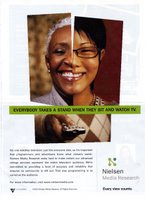
The story below appeared in The Christian Science Monitor. Apparently, Mexican President Vicente Fox was wrong when proclaiming, “There is no doubt that Mexicans, filled with dignity, willingness and ability to work are doing jobs that not even Blacks want to do there in the United States.”
----------------------------------------------------------------------
Rising black-Latino clash on jobs
By Daniel B. Wood
Staff writer of The Christian Science Monitor
LOS ANGELES - From where Johnny Blair Vaughn sits outside Lucy Florence Coffee House in the heart of Los Angeles's black community, he can feel the temperature rising over immigration.
The biggest reason, says the father of seven, is jobs.
“If you drive across this city, you will see 99 percent of all construction is being done by Hispanics.... You will see no African-American males on these sites, and that is a big change,” says Mr. Vaughn, who has worked in construction for two decades. His two oldest boys, in their early 20s, have been turned down so many times for jobs — as framers, roofers, cement layers — that they no longer apply, he says.
While Los Angeles is ground zero for black-Hispanic friction these days, echoes of Vaughn’s words are rising throughout urban black America as Congress labors over immigration reform. In cities where almost half of the young black men are unemployed, a debate is raging over whether Latinos — undocumented and not — are elbowing aside blacks for jobs in stores, restaurants, hotels, manufacturing plants, and elsewhere.
Hispanics and blacks tend to gravitate to the same inner-city areas and low-skill labor markets — and the result is a clash over jobs that require less skill and less education, experts say.
“In this era of mass immigration, no group has benefited less or been harmed more than the African-American population,” says Vernon Briggs, a Cornell University professor who researches immigration policy and the American labor force.
Yet a precise relationship between the presence of immigrants and the loss of black jobs has not been clearly proven in research. Rather, the influx of legal and illegal immigrants has been so massive that it has affected the internal migration of native-born Americans to the point where “economists have given up trying to prove a one-to-one-displacement,” says Dr. Briggs.
Some Latino groups, meanwhile, counter that such a correlation is more a perception than a reality.
“We are fighting ... hearsay and opinion,” says Randy Jurado Ertll, a Hispanic educational consultant and director of El Centro de Acción Social, Inc., a community service organization in Pasadena, Calif. “Blacks say, ‘Hey a Latino immigrant came and took my job,’ and some Latinos say, ‘Blacks have all the jobs at the post office or city hall and don’t want to give jobs to Latinos.’”
Statistics show that young African-Americans are having trouble in the job market. Unemployment among young blacks nationwide is 40 percent, according to the US Bureau of Labor Statistics. “For blacks, the growing presence of immigrant workers adds to the formidable obstacles they face in finding a job,” said a Pew Research Center study released in April. Among blacks, 78 percent say jobs are difficult to find in their community compared to only 55 percent of Hispanics.
Many economists disagree that immigration is the reason black unemployment is high. Instead, shrinking budgets for job training and creation, industry downsizing and manufacturing flight to foreign countries are to blame.
Yet the perception that Hispanic immigrant workers are pushing blacks aside in the job market is evident in many cities with a high black population including Los Angeles, Detroit, Philadelphia, Washington, and Denver, Briggs says.
“Latinos and blacks are at each others’ throats in our jails and in our high schools,” says Najee Ali, an activist based in Chicago and Los Angeles.
Mr. Ali notes that Mayor Antonio Villaraigosa had to intervene after several high school brawls broke out between Hispanics and blacks in recent months. Riots in the Los Angeles County Jail — the nation’s largest — came about in part because of tensions on the streets between black and Hispanic gangs, observers say.
“Undocumented immigration that is taking jobs from blacks is the number one issue nationwide. Unless we address it, the same kind of eruptions we are seeing in Los Angeles will jump to these other cities as Latino populations increase there,” he says.
Others point out that tensions between blacks and Hispanics are not new and are not tied solely to immigration. They also result from a competition for housing, education, and healthcare due to the sheer number of Latinos — they are the largest and fastest-growing minority group. Hispanics’ increasing political clout as well as recent immigrants-rights demonstrations involving hundreds of thousands Hispanic immigrants in dozens of cities have roiled many in the black community.
“It angers me because I know that the jobs immigrants are coming to get are not just the ones they got in the past ... seasonal jobs for picking,” says Vaughn. “They got a glimpse of what America is, and they want a piece of the American pie. I can’t blame them ... but there has to be a way for the government to step in and make it fairer so that African-Americans can be employed also.”
A vast majority of blacks, including Vaughn, believe Latin American immigrants are hard working, according to the poll taken by the Pew Research Center. Blacks are also more sympathetic than whites to the plights of immigrants.
They remember their own struggle to gain civil rights and the help that Latinos offered during the 1960s.
“The battle over immigrant rights will be fought as fiercely and doggedly as the civil rights battle of the 1960s. That battle forever altered the way Americans look at race. The immigrants-rights battle will profoundly alter the way Americans look at immigrants,” says Earl Ofari Hutchinson, author of nine books on the black experience.
Today, the black community is split over how to address immigration. The NAACP, the Congressional Black Caucus and the Leadership Conference on Civil Rights generally support the immigrant marches. They’re against exposing all illegal immigrants to felony charges as outlined in a bill passed by the US House in December. A California Field Poll in April found that 82 percent of blacks instead support a US Senate measure, which would give undocumented workers currently in the US for more than five years the opportunity of citizenship.
But a vocal subset of blacks has a different view. Choose Black America, a coalition of business, academic, and community leaders, formed this week to advocate for stronger border security and not allow illegal immigrants to become citizens.
In April, a band of protesters marched in front of the office of Rep. Maxine Waters (D) of California because she, along with the Rev. Al Sharpton and Jesse Jackson, supports citizenship for illegal immigrants. Blacks also have “singed the phone lines at black radio talk shows with anti-immigrant tirades” and “bombarded black newspapers with letters blasting illegal immigrants,” says Hutchinson.
“It’s definitely one of the hottest topics on talk radio I’ve ever seen,” says Greg Johnson, marketing director of KJLH, a leading black radio station in Los Angeles. The majority of callers favor more conservative enforcement solutions to immigration, but the station is getting callers on all sides, he says.
“Some are adamant to get them [immigrants] out; others say, ‘let’s work with them;’ and others say ‘let’s figure out how to regulate it,’” says Mr. Johnson. “Some of the stress I’m seeing I don’t understand. Blacks are divided on this issue and it needs to be talked out ... Latino/black relationships have to be resolved. We all live in the same neighborhoods we are part of the same community.”
Despite these differences, some in the black community are seeking to build an alliance that lifts both blacks and Latinos.
With Rev. Sharpton and Christine Chavez, the daughter of United Farm Workers founder Cezar Chavez, Ali is expanding a national black and Hispanic coalition in Chicago, Atlanta, Houston, Washington, and New York — modeled after efforts started here last August. The groups are trying to find common ground on jobs, housing, education, healthcare, and controlling gangs.
Mr. Ertll says his group wants to meet at both the official and grass-roots levels to address the concern of low-income jobs for all ethnicities.
But some do not agree with construction worker Vaughn and others who say that Hispanics are a threat to blacks trying to find work.
“Yes, immigrants are coming in to take the jobs, but if you really put your mind to it, you can get one,” says Jamal Dillard, 18, who just got hired as a courtesy clerk at Albertsons grocery for $6.75 per hour.
Some Hispanic and black thinkers agree that many American employers are taking advantage of both groups.
“It is past time for all African-Americans to understand that our interests and those of immigrants are not at odds,” wrote Sharpton in a reply to critics. “Those truly concerned about economic fairness would be better off targeting businesses that exploit and underpay illegal immigrants to the detriment of American workers.”
That detriment is the bidding down of wages for all lower-income jobs.
“The real culprits are the employers who work people 12 to 14 hours a day at $8 an hour or less without having to pay payroll taxes or provide any other form of benefits,” says Ernesto Nieto, president of the National Hispanic Institute. “To direct blame to people in need because of American greed is to beg the question of who’s really at fault here and who’s really playing by the rules.”



















































